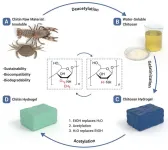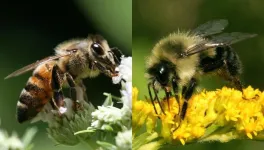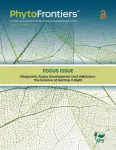Robotics: New skin-like sensors fit almost everywhere
Automated production for different objects
2023-07-17
(Press-News.org)
“Detecting and sensing our environment is essential for understanding how to interact with it effectively,” says Sonja Groß. An important factor for interactions with objects is their shape. “This determines how we can perform certain tasks,” says the researcher from the Munich Institute of Robotics and Machine Intelligence (MIRMI) at TUM. In addition, physical properties of objects, such as their hardness and flexibility, influence how we can grasp and manipulate them, for example.
Artificial hand: interaction with the robotic system
The holy grail in robotics and prosthetics is a realistic emulation of the sensorimotoric skills of a person such as those in a human hand. In robotics, force and torque sensors are fully integrated into most devices. These measurement sensors provide valuable feedback on the interactions of the robotic system, such as an artificial hand, with its surroundings. However, traditional sensors have been limited in terms of customization possibilities. Nor can they be attached to arbitrary objects. In short: until now, no process existed for producing sensors for rigid objects of arbitrary shapes and sizes.
New framework for soft sensors presented for the first time
This was the starting point for the research of Sonja Groß and Diego Hidalgo, which they have now presented at the ICRA robotics conference in London. The difference: a soft, skin-like material that wraps around objects. The research group has also developed a framework that largely automates the production process for this skin. It works as follows: “We use software to build the structure for the sensory systems,” says Hidalgo. “We then send this information to a 3D printer where our soft sensors are made.” The printer injects a conductive black paste into liquid silicone. The silicone hardens, but the paste is enclosed by it and remains liquid. When the sensors are squeezed or stretched, their electrical resistance changes. “That tells us how much compression or stretching force is applied to a surface. We use this principle to gain a general understanding of interactions with objects and, specifically, to learn how to control an artificial hand interacting with these objects,” explains Hidalgo. What sets their work apart: the sensors embedded in silicon adjust to the surface in question (such as fingers or hands) but still provide precise data that can be used for the interaction with the environment.
New perspectives for robotics and especially prosthetics
“The integration of these soft, skin-like sensors in 3D objects opens up new paths for advanced haptic sensing in artificial intelligence,” says MIRMI Executive Director Prof. Sami Haddadin. The sensors provide valuable data on compressive forces and deformations in real time – thus providing immediate feedback. This expands the range of perception of an object or a robotic hand – facilitating a more sophisticated and sensitive interaction. Haddadin: “This work has the potential to bring about a general revolution in industries such as robotics, prosthetics and the human/machine interaction by making it possible to create wireless and customizable sensor technology for arbitrary objects and machines.”
Further information
Scientific video showing the entire process: https://www.youtube.com/watch?v=i43wgx9bT-E
Sonja Groß and Diego Hidalgo are currently serving as research associates and leading authors of the paper “Soft Sensing Skin for Arbitrary Objects: An Automatic Framework” at the Munich Institute of Robotics and Machine Intelligence (MIRMI), TUM. Working alongside them are senior scientists Dr.-Ing. Amartya Ganguly and Dr.-Ing. Abdeldjallil Naceri, who bring their extensive expertise to contribute to the research conducted at MIRMI. With MIRMI, TUM has created an integrative research centre for science and technology to develop innovative and sustainable solutions for key challenges of our time. Led by Prof. Sami Haddadin as Executive Director, the institution has leading expertise in key areas of robotics, perception and data science. More information: https://www.mirmi.tum.de/.
Additional editorial information:
Photos for download: http://go.tum.de/679599; http://go.tum.de/838963; http://go.tum.de/816901; http://go.tum.de/289008
END
ELSE PRESS RELEASES FROM THIS DATE:
2023-07-17
Chitin hydrogel is recognized as a promising material for a variety of biomedical applications. Its biocompatibility and biodegradability make it useful in tissue repair, artificial organs, and wound healing. Yet scientists continue to face challenges in fabricating chitin hydrogel. A team of researchers has developed a green, efficient and scalable preparation method for chitin hydrogels.
The team’s work provides a rational strategy to fabricate chitin hydrogels and paves the way for its practical applications as a superior biomedical material.
Their ...
2023-07-17
Improving diagnosis in health care is a moral, professional and public health imperative, according to the U.S. National Academy of Medicine. However, little is known about the full scope of harms related to medical misdiagnosis — current estimates range widely. Using novel methods, a team from the Johns Hopkins Armstrong Institute Center for Diagnostic Excellence and partners from the Risk Management Foundation of the Harvard Medical Institutions sought to derive what is believed to be the first rigorous national estimate of permanent disability and death from diagnostic error.
The original research article ...
2023-07-17
Press materials are now available for NUTRITION 2023, the annual flagship meeting of the American Society for Nutrition (ASN). Top nutrition scientists and practitioners from around the world will gather to share the latest research findings on food and nutrition during NUTRITION 2023, held July 22-25 at the Sheraton Boston.
Register for a press pass to attend NUTRITION 2023 in person or to access embargoed press materials before the meeting. Explore the meeting schedule, poster presentations, and oral presentations to see all the exciting research topics covered at this year’s meeting.
EMBARGOED MATERIALS
Researchers Identify Genes ...
2023-07-17
Annapolis, MD; July 17, 2023—Responsible use of pesticides includes striving to avoid negative effects on the environment, often with an emphasis on protecting bees and other pollinators. A new study, however, finds that many common methods for minimizing pesticides' impact on bees—even some recommendations on product labels—are backed by minimal scientific evidence.
The researchers behind the study say stronger testing is needed to evaluate which bee-protection measures are truly effective ...
2023-07-17
FEMSelect Ltd., a women-led company developing innovative technologies to make a lasting impact on women's health, today announced positive results from a large six-month safety and outcome study of EnPlace® in 123 women with pelvic organ prolapse, published in the International Journal of Gynecology & Obstetrics(IJGO).
The article, titled The EnPlace® sacrospinous ligament fixation—A novel minimally invasive transvaginal procedure for apical pelvic organ prolapse repair: Safety and short-term outcome results,1 discusses how investigators found that EnPlace, cleared by the FDA for attaching sutures to ligaments of the ...
2023-07-17
Giving patients with operable pancreatic cancers a three-pronged combination immunotherapy treatment consisting of the pancreatic cancer vaccine GVAX, the immune checkpoint therapy nivolumab and urelemab, an anti-CD137 agonist antibody treatment, is safe, it increases the amount of cancer-killing immune system T cells in the tumors and it appears effective when given two weeks prior to cancer-removal surgery, according to new research directed by Johns Hopkins investigators. A description of the work was published online June 20 in the journal Nature Communications.
This study, led by researchers at the Johns Hopkins Kimmel Cancer Center, the Bloomberg~Kimmel ...
2023-07-17
The nonprofit PhRMA Foundation launched a new grant program to provide more than $1 million in funding for research on the use of digital health technologies (DHTs) in underrepresented populations in clinical trials to advance regulatory decision-making.
Based on applicants’ letters of intent, the Foundation will award up to eight $25,000 planning grants to support the development of detailed research proposals to compete for two $500,000 grants. Planning grant award recipients will also be offered a $5,000 promotional credit from ...
2023-07-17
Chestnut Hill, Mass. (7/17/2023) – Putting truth to the test in the “post-truth era”, Boston College psychologists conducted experiments that show when Americans decide whether a claim of fact should qualify as true or false, they consider the intentions of the information source, the team reported recently in Nature’s Scientific Reports.
That confidence is based on what individuals think the source is trying to do – in this case either informing or deceiving their audience.
“Even when people know precisely how accurate or inaccurate a claim of fact is, whether they consider that claim to be true or false hinges on the intentions ...
2023-07-17
The vast scale of global trade presents a constant threat of introducing new plant diseases, which is challenging to the United States system of biosecurity. Plant health professionals often must respond quickly to a newly introduced or emerging plant disease outbreak even before a well-validated diagnostic test is available. Additionally, thousands of plant pathogens that already exist have been routinely diagnosed with assays that were not fully or consistently validated, which can lead to inaccurate diagnoses, delays in proper disease management, and significant consequences for growers and the public.
Growing awareness of this gap in coordination and resources for plant disease ...
2023-07-17
Political apathy is growing in democracies around the world. Political apathy, also known as political alienation, describes feelings of separation and disaffection, a sense of powerlessness and an indifference to politics and political institutions. A hallmark of political alienation is a refusal to vote or participate in political activities. Adolescents and young adults are no exception to these trends. In many countries in Europe and North America, the youngest voters have the lowest participation rates.
Why are new voters so apathetic about politics? Many factors are ...
LAST 30 PRESS RELEASES:
[Press-News.org] Robotics: New skin-like sensors fit almost everywhere
Automated production for different objects



